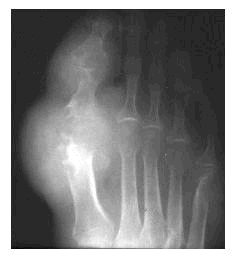Gout, what causes it and what you can do
 An ancient disease, Gout is a common type of inflammatory condition that causes immediate attacks of pain, tenderness, redness, warmth and swelling in some joints.
An ancient disease, Gout is a common type of inflammatory condition that causes immediate attacks of pain, tenderness, redness, warmth and swelling in some joints.
It occurs when there is too much uric acid in the blood, tissues and urine. In people with gout, the body does not produce enough of the digestive enzyme uricase which changes relatively insoluble uric acid into a highly soluble compound. When there is too much uric acid, it accumulates in the blood and tissue, and ultimately, crystalizes.
When it crystallizes, uric acid takes on a shape like that of a needle, and like a needle, it jabs its way into the joints. It seems to prefer the joint of the big toe, but other joints can be vulnerable as well, including the mid-foot, ankle, knee, wrist and even the fingers.
Acute pain is usually the first symptom. The affected joints then become inflamed and almost infected-looking – red, swollen, hot and extremely sensitive to the touch. Over time, this can harm the joints, tendons, and other tissues.
The over production of uric acid in the body can be from genetics but. It can also occur as a complication of other conditions. Some people inherit the inability to process uric acid and the ability to lose it in the urine.
Uric acid is a byproduct of certain foods, so gout is closely related to diet. Obesity and an improper diet increase the risk of developing gout. Once believed to be the result of gluttony Gout has been called the rich man’s disease, since it is associated with too much rich food and alcohol.
However, while such overindulgence can definitely heighten the risk of gout—anybody can be affected by the pain of gout. In fact it affects people from all walks of life, most commonly men between the ages of forty and fifty.
It may be inherited or brought on by crash dieting, drinking alcohol and certain medications especially diuretics.
Other potential triggers of gout include:
- Surgery
- Stress
- Crash diets
- Sudden, severe illness
- Chemotherapy
- Joint injury
- High blood pressure
- Excessive exercise.
A few people will only experience one gout attack. However, for most people the gout attacks will keep coming back every few months and will be worse in intensity. If the disease is left untreated, it may result in crippling damage to the joints
Why Do Uric Acid Levels Get So High?
There are two main reasons:
1.Your body makes too much uric acid.
2. Your body doesn’t get rid of enough uric acid.
You may be surprised to learn that for 90% of gout sufferers, the problem is the second one.
They can’t excrete uric acid properly and that causes painful crystals to form in their joints. The result? Inflammation, pain, and those dreaded gout flares.
What’s Stopping Your Body from Flushing Uric Acid?
In most cases, it comes down to insulin resistance.
When your insulin is high, your kidneys reabsorb uric acid instead of flushing it out. This keeps uric acid levels climbing and puts you at risk for gout.
The Secret Weapon: Water
Drinking more water can make a big difference.
Why? Because it helps your kidneys flush out uric acid every time you pee. Studies show that drinking at least 3 liters of water daily can significantly lower uric acid levels.
But remember, if you’re going to drink that much water, make sure you’re also getting enough electrolytes (like potassium, magnesium, and salt) otherwise, you risk flushing out key nutrients your body needs.
Fixing the Root Problem: Insulin
Since insulin resistance is a big reason for high uric acid because it stops your kidneys from excreting it, lowering your insulin levels can help.
This means you must improve your metabolic health.
(FYI – Rapid weight loss can temporarily trigger a gout flare if uric acid levels are high. Don’t give up—stay the course!)
Let’s summarize…
1. Fix insulin resistance.
2. Drink a lot more water.
3. Take electrolytes.
4. Build muscle
5. Avoid dehydration since it triggers a surge in uric acid.
Understanding Metabolism and how to Improve it.
STILL HAVE QUESTIONS? EMAIL AND GET YOUR QUESTIONS ANSWERED or call 818 252-1038
Sign up to receive the MCVitamins Newsletter!
Up-to-date info on the latest health-related news happening in the world
(available in English only)

